#me: i like frontend development!
Explore tagged Tumblr posts
Text
I hate reading MAUI documentation. wtf are you talking about.
FindAncestorBindingContext indicates the BindingContext of the ancestor in the visual tree of the bound element. This mode should be used to bind to the BindingContext of an ancestor represented by the AncestorType property. For more information, see Bind to an ancestor.
0 notes
Note
A wee curiosity ( feel free to delete if this sounds rude, I absolutely don't mean for it to be at all) : In your article, you refer to Archive Of Our Own as "the AO3" ( rather than simply "AO3") and I was just wondering about the linguistics of it? Why add "the" to it?
Haha don't worry, it doesn't sound rude! A lot of folks back in the day called it "the AO3" and some still do. For example:
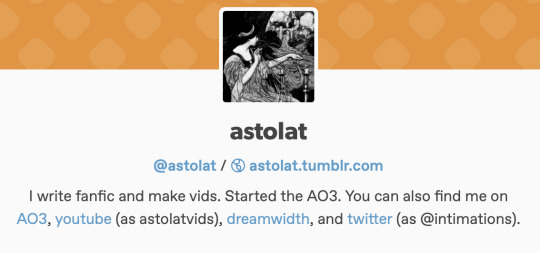
I use "the AO3" and "AO3" somewhat interchangeably, though I know from editing many Fansplaining transcripts that both Flourish & I are more likely to say the former than the latter aloud. (The) AO3 itself uses both on their FAQ! They also use "the Archive," which I use a fair amount in journalism (e.g., this piece I reported ~5 years ago on their frontend development), because you have to mix things up a bit when you're constantly referencing the same thing. :-D
I have actually noticed the article "the" vanishing before organization acronyms over the past decade, and it's jarring to me—radio reporters talking about "EPA's fight at the Supreme Court" or whatever. It makes me think of the creeping brand-ification of language overall—see one of my most beloathed examples, Apple's policy of just calling it "iPhone":

So maybe it's because I'm always thinking of "the AO3" as "the Archive," a thing on which you post and read, and not "AO3" which feels more like a brand? I mean, in reality I'm not giving this that much thought—it's just a long-held habit! Clearly I am not a linguist, because I don't have the language to explain what's happening here—and also because linguists find language changes fun, and I'm sitting here grumbling at Tim Cook, "It's THE iPhone!!"
54 notes
·
View notes
Note
Hi there, Love your work! I'm also doing stuff in Unreal and it feels like it's rarer to find other indie devs using it. I love how clean all your UI feels, and UI is something I seem to really struggle with.
Do you have any recommendations for workflows / tips / sources etc for getting better at UI?
Also I'd love to know more about the material / shader workflow for your latest post if you have more information anywhere.
Thanks :)
Hello there! Thank you!! I hope you don't mind me answering publicly as I feel like some people might be interested in the answer!
I really appreciate your UI (User Interface for those not knowing the acronym) compliment as it's something I've spent a long time working on and specializing in, in my career as a software engineer. UI/UX often goes completely unacknowledged or taken for granted even though it takes a lot of time and hard work to create and develop. In the engineering world I frequently had to advocate for and explain user experiences to those who didn't have as deep of an appreciation for UI or a very sophisticated understanding of why a good, visually appealing user experience makes, or on the flip side, can break everything. I think it's a very challenging, overwhelming topic to grasp and communicate, but just by being interested in it you're already way ahead!
There's a lot going on with UI. From visuals to knowing common design elements to successfully conveying a story to the user to implementation to testing to designing for accessibility to animation and I probably didn't cover everything with that run-on sentence. There's frontend engineers out there whose role is solely to maintain and improve UI component libraries for companies. And that's without throwing games, whose UIs are all uniquely visually tailored to their experiences, into the mix... I could keep going on about this honestly, but I'll get to what I think you can do personally! 1. Learn about common design patterns. What's a toast? What's pagination? What's a card? Little things like that. These apply to all software UI/UX, including video games- and knowing these off the top of your head will make it so much easier for you to invent your own UI designs and patterns.
2. Study the UI in the everyday applications you interact with. Step through menus and think about how you got from point A to point B. Take a moment to think about the why someone put a button where they did. Study the UI in your favorite video games, too! Take a lot of notes on what you think works really well and what you think doesn't. And also there's online resources that are great for inspiration. I personally spend a lot of time on the Game UI Database. - https://dribbble.com/ - https://www.gameuidatabase.com/ 3. Don't be afraid to start with basic sketches or even just simply representing everything with grey boxes. All my UI starts out as really crappy sketches on paper, or tablet sketches on top of screenshots. Visualize your ideas and then keep iterating on them until you've got something. For example, I went from this:
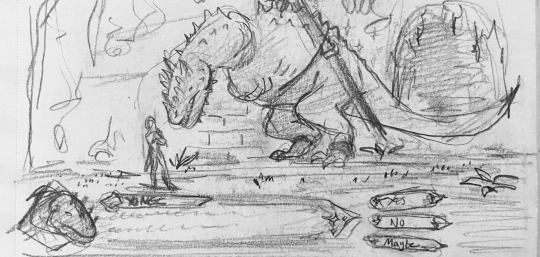

To this. (And come to think of it I might actually still want to make those cooler looking buttons in my sketch) 4. Break everything out into pieces and individual components. A good UI is made up of building blocks that you can reuse all over the place. That's how it stays consistent and also saves you a lot of stress when you need to go in and update components. Instead of a million different looking UI pieces, you just have to update the one! These individual components will make up your very own UI Component Library, which will be the standardized design system and source of reusable components for your project. This also applies to your visual elements that don't do anything (like I personally have a whole mini library of diamond and star shapes that I reuse everywhere).
For reference, here's a breakdown I made of my Inventory UI. On the right, I've labeled most of the individual components, and you might be able to see how I'm reusing them over and over again in multiple places.
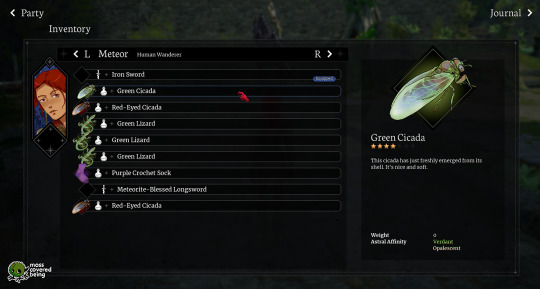
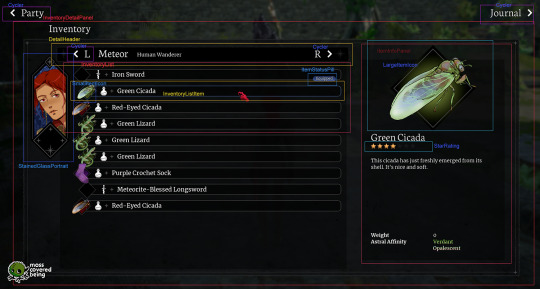
5. Spend some time listening to designers talk, maybe befriend some designers! Many of them have an unique, interesting view of the world and how we interact with it even beyond just software. Their perspectives will inform yours.
6. Test your UI on users whenever you can. Get feedback from others. This is the best way for you to see what works and what doesn't. As game devs we spend so much time with our games it's easy for us to lose sight of the full picture.
7. Be patient and don't give up. Continue to be open to expanding your knowledge. These UI skills take time to develop. I personally am still learning even after like 10 years of doing it. Coming up with the visual elements is very challenging for me and I spend a lot of time rearranging things in photoshop before I actually start coding anything at all in Unreal.
Whew, that was a lot, but I hope that gives you some thoughts and a place to start!
I don't have any posts out there about Blender/Unreal shader workflows right now, but I'll consider making another post sometime soonish. I appreciate you asking and you're welcome! :)
22 notes
·
View notes
Text
Whenever people complain about the long-overdue change from AAA games costing $60 to games costing $70 (which let's be real - they already did in some places back in the 2000's/2010s. Retailers with no nearby competition would sell wii games WAY above market value, all the time. Ask me how I know.) The common refrain is always that spending power is down (true.) and that most of the dev budget and profits aren't even GOING to the developers, the CEOs are just pocketing it (also true.) But it's also hard for me to care about those factors when the expectation for what a game should cost has been thrown out the window.
Sonic Adventure retailed at $60 in the U.S in 1998, which is about $115 in today's money, and it takes 9 hours to clear the whole story. Sonic Frontiers had a larger team, budget, development schedule, and despite the fact it has nearly double the amount of gameplay, it sold at almost half the price of Sonic Adventure. Adjusted for inflation.
When I was in middle school, it was understood that if a game was free, it was most likely made by someone on their free time, and therefore it would probably be short and simple. The mobile apps that were worth your time all cost 99 cents. This was a fee people were willing to pay, because a song on iTunes also cost 99 cents. Games with microtransactions were already taking advantage of gambling addictions, so people were willing to put up with a certain amount of adware on the free app market to avoid them.
Then everything went wrong at once. Free-to-Play video games were popping up all over the place with the amount of content you'd normally expect from the most ambitious AAA titles, and the content updates you'd expect to see from subscription-based MMOs to keep things fresh. Music could be streamed, so nobody wanted to spend 99 cents to own a copy of their favorite song anymore, and suddenly that fee looked too high for apps as well. Then Apple stopped pushing the paid apps, encouraging every developer to make apps that either monetized every corner with ads, or baited players into constant microtransactions so they'd be more than one-time sources of income. And despite being driven primarily by cynical profit motives, the leadership of most American AAA studios wanted to be compared to Hollywood. And so games are being pushed to look more like Movies. Photorealism. Cinematics. Stories that resemble the Movies. Stuff had to be more and more ambitious while costing less and less for the consumer on the frontend, sometimes in ACTUAL dollar amount and sometimes just adjusted for inflation, while also being designed to wring as much money out of every player as humanly possible. It's still going on like this and we all know it isn't fucking sustainable.
But sure. your DLC contains stuff you feel should have been in the base game now. The default price is $10 more - and once they've patched out as many of the issues they were forced to ship with as is realistically possible, you'll get what you paid for out of the experience.
You realize that if you get your reality where we have smaller games with worse graphics made by people paid more to work less, the price of heavily marketed, retail-worthy games will still probably go up, right? Because those likely won't go anywhere, even if they all start to look like what we think of as AA now rather than AAA. For a game to ACTUALLY cost $70 it'd need to maintain mass market appeal so it could sell enough copies to make back budget and probably fund the next dev cycle. Because in this world, game devs wouldn't be beholden to shareholder interests, right?
I'm not saying this to discourage you from that way of thinking in the slightest. I'm just pointing out that, as with SO many things in our lives, your sense of what something costs to produce is incredibly divorced from reality because of just HOW exploited the labor behind it is.
But to be completely honest, if an extra $10 on the base price of SOME PS5 games is enough of a stumbling block for you, I don't know how you'll handle the value for that money decreasing, as well.
12 notes
·
View notes
Text
Motivation for self-taught developers
youtube
I saw this video on YouTube and it’s really encouraging! He’s self-taught from being a receptionist at a hospital to then moving to learn Frontend Development and started getting work on UpWork slowly and eventually getting part time work to then a full time job! He started going to a boot camp but quit after he realised the technology used weren’t on any job ads around where he lived so he sticked to doing some jobs on UpWork!
This definitely motivated me like wow :o
#resources#codeblr#coding#studyblr#studying#progblr#programming#comp sci#computer science#motivation#study movitation#web development#Youtube
94 notes
·
View notes
Note
Hey, what made you want to become a Front end dev?
Hiya,
TLDR: I like art & design + programming and Frontend Web Development allows me to exercise both~! 🐼💓
I love designing and building websites. I'm a creative person - in highschool I studied Art & Design, Graphics and Media. basically if getting into Medical School failed, I was going to go into Graphic Designing~!
But I dropped out in the last year, so I focus on programming (influenced by my dad of course) and I thought "What job combines being artistic with programming?" I googled it and the first one of the list was Frontend Web Development so I ran with that~!
Learnt HTML, CSS, JS and Python, applied for Software Development apprenticeship whilst doing a Frontend Dev bootcamp (free from the UK government) and here I am~!
Amongst my tech friends, I'm known for "designing pretty websites that may/may not be fully functional but at least the designs are cute"... I just asked them as I write this so I don't know how I feel about that-
That's all really 😅🙌🏾
28 notes
·
View notes
Text
My Journey to Becoming a Frontend Developer
In today’s fast paced digital world, frontend development has become the cornerstone of delivering exceptional user experiences. From seamless web app navigation to visually stunning interfaces, a frontend developer brings ideas to life.
Why I Want to Be a Frontend Developer and How HNG Will Help Me Achieve My Goals
My journey to becoming a frontend developer is fueled by a passion for creativity, problem solving, and the desire to create applications that users love. Joining HNG internship bootcamp as a frontend developer is the perfect opportunity to sharpen my skills and gain hands on experience while contributing to real world applications.
My Motivation for Becoming a Frontend Developer
Ever since I first interacted with web technologies, I’ve been fascinated by the magic of turning code into functional and beautiful interfaces. It’s amazing how a few lines of HTML, CSS, and JavaScript can create immersive websites and applications that millions of people rely on daily.
Another reason I gravitate toward frontend development is its user centric nature. I love the idea of creating intuitive and visually appealing designs that make people’s lives easier. I’m driven by the opportunity to make technology accessible and enjoyable for everyone.
How HNG Will Help Me Grow in the Field
The HNG internship bootcamp is a game changer for aspiring developers like me. One of the most significant challenges in the tech world is bridging the gap between theoretical knowledge and real world application. HNG provides the perfect platform to tackle this by immersing participants in a fast paced, project driven environment.
Here’s how I believe HNG will accelerate my growth:
Hands On Experience: HNG’s focus on building real life applications aligns perfectly with my goal to learn by doing. By collaborating with a team to tackle real world challenges, I will develop technical skills that can’t be learned in isolation.
Mentorship and Guidance: HNG’s experienced mentors will provide valuable insights and feedback, helping me refine my coding skills, improve my design thinking, and understand industry best practices.
Exposure to Modern Tools and Frameworks: The bootcamp emphasizes modern frontend technologies. This aligns with my goal of mastering the tools that drive innovation in the industry.
Networking Opportunities: Being part of a vibrant community of like minded developers and industry experts at HNG will expand my professional network and open doors for future opportunities.
My Goals for the Internship and How I Plan to Achieve Them
During my time at HNG, my primary goal is to become a finalist in the frontend track and I plan to achieve this through other key goals such as:
Master Frontend Fundamentals: I aim to strengthen my knowledge of HTML, CSS, JavaScript, and popular libraries like React. I plan to achieve this by actively participating in all coding sessions and tasks, seeking feedback, and consistently practicing.
Contribute to Real World Projects: One of my key goals is to contribute meaningfully to the applications we build at HNG. By collaborating with team mates, meeting deadlines, and embracing challenges, I hope to add value to every project as I move up the ladder.
Enhance Problem Solving Skills: Frontend development often involves debugging and optimizing code. I will approach every challenge as an opportunity to learn and improve my critical thinking.
Develop a Strong Portfolio: By the end of the internship, I want to have a portfolio showcasing my contributions to real world applications, demonstrating my skills to potential employers that require the service of an experienced JavaScript and React developer.
Conclusion
Becoming a frontend developer is not just a career choice for me, it’s a passion that aligns with my creative and technical interests. The HNG internship bootcamp provides a unique opportunity to accelerate my growth, gain hands on experience, and prepare for the dynamic world of frontend development. With a clear vision of my goals and a commitment to learning, I’m excited to embark on this journey and make the most of this incredible opportunity at HNG.
2 notes
·
View notes
Text
Just in case you were wondering
Big city area where I live;
(All Numbers pulled off indeed)
Waitress @ Red Robin : $73k/yr + benefits and tips
Front Desk Secretary @ Bank : $54k/yr + benefits
Warehouse: $34k/yr - no benefits
And I know you're like what the fuck already but get this one;
Police officer; $28k/yr + benefits + douchebags
But get this, this is the real kicker;
Frontend (make buttons, sliders, menus) Programmer / Developer : $112k/yr + benefits
Ok the button guy makes as much as 4 cops - cool. So what, you all ask me, a beatupoldpickuptruck.
Here's some more jokes;
Director @ Trust Fund $85k/yr + benefits
Chief of Police @ (Precinct) $65k/yr + benefits
National Parks Service Ranger: $32k/yr no benefits
Backend (math, computation, everything not user facing in software) programmer / dev;
*drumroll*
$184,650/year + benefits + STOCK.
SO 👉👉 if you wanna *fight the bourgeois* or *overthrow the patriarchy* or get rich so you can buy your dream cottagecore tiny home, or buy a private island to build an entirely Wicca society, whatever you want
you should probably learn to code.
Specially since them daggum learning machines are getting so good at art and writing that sometimes you can't even tell the difference?
Only way to sieze control of the levers of power are to become the controllers of the sources of that power.
Wrench away the machines from the evil doers and capitalists
Let free your creativity on the canvas of virtual machines
Set yourself free, wielding knowledge as your sword.
Then no one can disarm you.
But that's just what this beatupoldpickuptruck thinks of things, don't pay me no mind, children.
49 notes
·
View notes
Text
Meeeee (˵ •̀ ᴗ - ˵ ) ✧
Hallo there ‧₊˚ ☁️⋅♡𓂃 ࣪ ִֶָ☾.
A little intro would be in order
My name’s Sam, 20 , a lover of learning, pinterest addict
I’m currently self studying frontend development, illustration(Adobe Illustrator) and a bit of ui/ux design.
In my free time, I read. Well I used to but I dunno… I don’t seem to do so anymore. Every book these days makes me sad. And I really want to get into the classics and Russian literature but they’re just so sad! Well maybe not all of them are sad sad but they have sad scenes where some character dies and it gets to me Every Time.(╥﹏╥) I’m working on it though, I’m pushing through David Copperfield. I love love looove the book so I’ve gotten very far by taking a one week pause after every heart breaking event. Like when…okay no spoilers.
I love learning philosophy, psychology, coding , science ( esp physics), pure mathematics and history. I’m not as well versed in them as I’d like but we learn every day!!
Career-wise I’d want to enter the engineering field.Electrical engineering orsomething related cos it's absolutely exciting!
Languages; I speak English, Fante and Norwegian( cos I moved here). AND I’m currently learning French( A2)
✮ ⋆ ˚。𖦹 ⋆。°✩ ✮ ⋆ ˚。𖦹 ⋆。°✩ ✮ ⋆ ˚。𖦹 ⋆。°✩ ✮ ⋆ ˚。𖦹 ⋆。°✩ ✮ ⋆ ˚。𖦹
What I’ve learnt so far: It’s really not so easy to learn a new skill sometimes. On most days I just want to give up cos it gets so frustrating. But that’s the price to pay I think. If you keep showing up, you’ll improve. You can’t not improve even if you tried. Put in the practice, mindful practice mind you. It’s not just about the number of hours you spend practicing. You have to make sure you’re learning and reviewing your mistakes at every point. But sometimes, you CAN’T find your mistakes. No biggie, just keep practicing. As you do it over and over again, your brain automatically learns what works and doesn’t. Trust me, the brain is wayyyyy more awesome than we think it is.
Souuu I’ll be blogging my journey. Everything about it and everything in between. I look forward to it ( ⸝⸝´꒳`⸝⸝).
Oh and here's my personal blog @hekademia
13 notes
·
View notes
Text
iMessage got reverse engineered

This is me texting my dad over imessage using an open source demo/proof of concept program that can send and recieve basic texts using the imessage protocol.
Disclaimer: this program stores all your encryption data in a VERY EASILY ACCESSIBLE PLAIN TEXT FILE, please don't share that file with anyone, and if you test it out, delete the file as soon as you're done with it. this is nothing more than a test application and not meant to be a full imessage replacement
it's not got good security, however the messages you send, appear to be private, they encrypt the data beforehand and send it directly to apple's servers (in madrid i guess), nothing in between or anything third party.
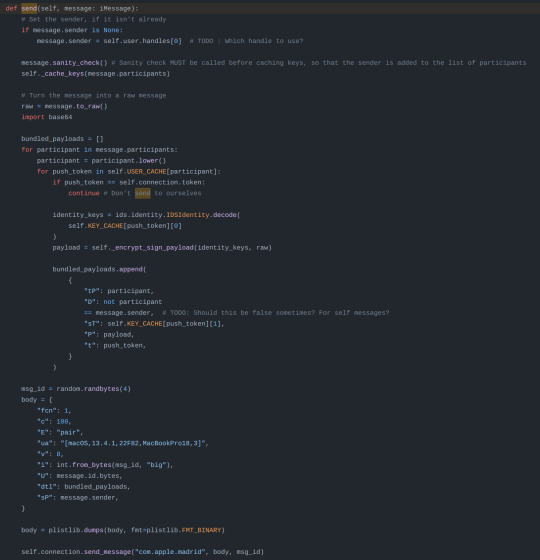
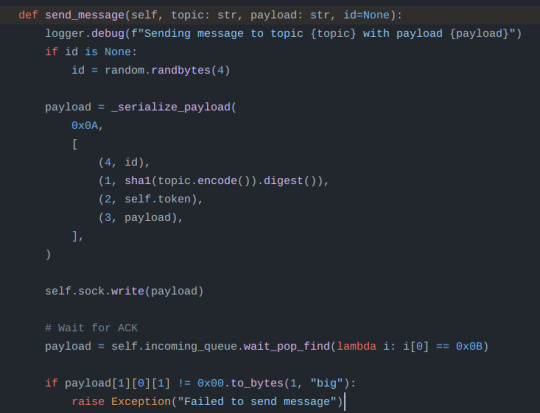
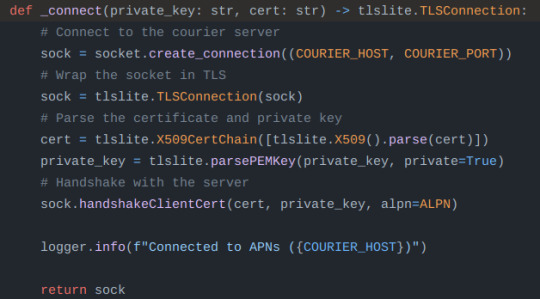
Sorry for no alt text, the screenshots are "send" function in imessage.py and the "send_message" and "_connect" function inside of apns.py, both are in the github link i sent earlier in the post ("socket" is a built in python package)
(dont trust a random tumblr user who barely knows how to code to tell you that this is safe, i dont know what im doing, this is just what i think was the relevant functions used in the program to send messages, and i could find no evidence of it stealing any data or sending it to third parties)
This was apparently bought and turned into "Beeper Mini", which. just takes this and makes it into an app that's 2$ a month to use, though (apparently) more secure, more features and you don't have to have it running all the time to get messages.
Beeper Mini is not open source so i have no idea if it's actually doing this or if it's actually private/secure. I would wait for it to be externally audited before using it, i'll add a reblog to this post if it ever does, or if any other programs use this method which have been audited to be as/more secure than the regular imessage app
And no, all of the news outlets reporting on this, beeper mini did not reverse engineer imessage, it's a frontend for someone elses work, which the developer was compensated for and they approve of it! it's not bad, i just dont like how it's being reported on, Beeper themselves even credit the dev:

woo
14 notes
·
View notes
Text
So, a month ago I finally got a job as a frontend dev, so, hooray,🥳, I now get to enjoy ✨Vue✨ and ✨Nuxt✨ 5 days a week and get paid for that. But since I've been unemployed for a very long time, this sudden change means that I'm even more tired to learn new things in my spare time, and also that there isn't much spare time now. I haven't posted much here before and so it seems I'm unlikely to be more active here in the future. Sad.
I did, though, try to read the 1st book on the list from the website Teach Yourself Computer Science, the one called Structure and Interpretation of Computer Programs (the reason for me to do that is because I don't have any STEM background, and, I guess, if I want to continue a career in a sphere rapidly encroached by AI, it's good to have some fundamental knowledge). I read about a ⅕ of the book, finally understood what it means for Haskell to be called a "lazy" language, but the exercises at the end of the chapters are too hard and math-heavy for me. Also, sad.
The book uses a programming language from the LISP family, called Scheme. I thought I could get by by installing Clojure instead, but that journey ended with the VS Code extension for Clojure, called Calva slowing down and then completely corrupting (?) WSL connection, so that I had then to reinstall my WSL "instance". (Yes, I use Windows, because I'm not a programmer). Which is sad, because the extension looked good and feature-heavy, it just couldn't function well in WSL environment for some reason…
After that, I installed Racket (another LISP) on the freshly reinstalled WSL distro, but then I couldn't pick up the book again and continue learning for, like, a week and a half, which is where I am at now. (Racket allows to define arbitrary syntax/semantics for the compiler, which in turn allows developers to create new domain specific languages distributed simply as Racket packages, with one of those packages being the dialect of Scheme used by SICP, the book mentioned earlier).
There is also the PureScript book, Functional Programming Made Easier by Charles Scalfani, which I'm unlikely to finish ever. The language is neat (it's very similar to Haskell, but compiles to JavaScript), but a bit overcomplicated for a simple goal of making interfaces. I do think, however, that I might try learning Elm at some point: the amount of time I've spent at work, trying to understand, why and at what point the state of some component mutated in a Nuxt app is, honestly, impressive, and I want to try something built around the idea of immutability.
2 notes
·
View notes
Text
PMT01: Scaffold nano & Trowel pico
Scaffold nano & Trowel pico v1.1.0 have been released tonight.
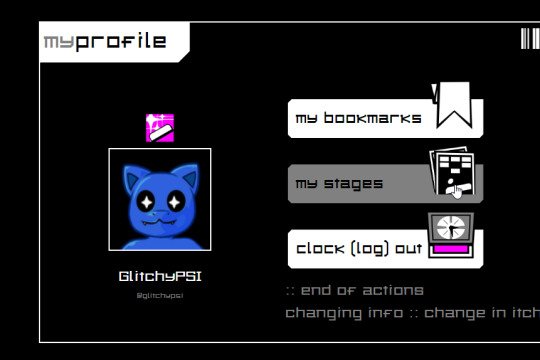
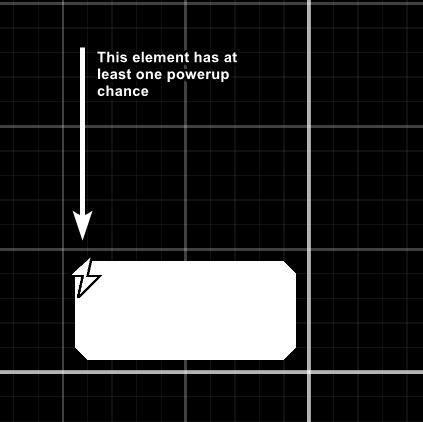
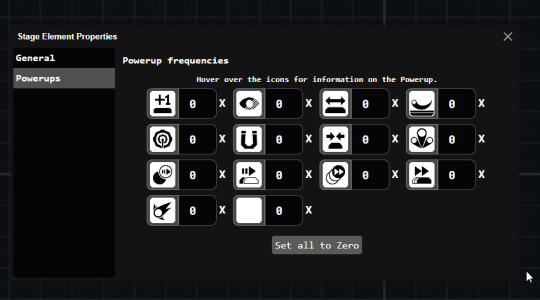
Updates add a myStages to Scaffold, and QoL improvements to the powerup editing experience in Trowel pico.
Now that it's out, I'd like to also take this moment to talk about the development and release of both.
One year minus one day ago I had announced in Twitter I would work on the level editor for the demo version of BRICKBREAKER SPRINT (nano) so fans could breathe in more life to the game even in its limited state and to also showcase how much it can do with its limited toolset at the current time.
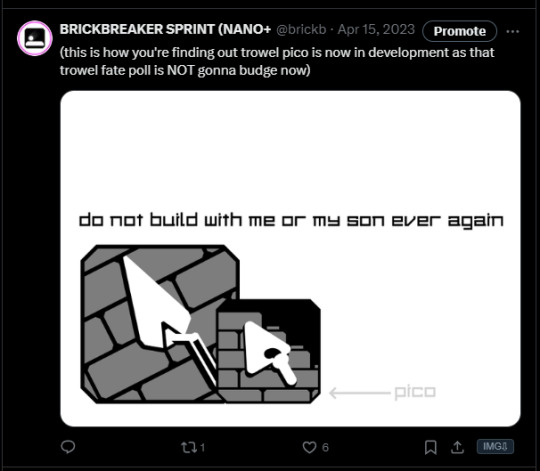
The reasoning for a completely separate technology version was simple, WebGL. WebGL in Unity is so limited for even the most basic things (I had to install a package to support cross-app copy/paste before nano+'s release!) and I said "hey, might as well give the multiplatform users something to be able to edit with, doesn't need to be just windows which is what the currently unpolished-ish trowel desktop is!"
But then it hit me that the same limitations would likely make it hell for me to support just levels downloaded as files (internally stored with "bxtp" extension btw :) ) so then... I came at a crossroads
just say FKIT and not do it, make ppl wait for BB Lite
still say FKIT and kickstart the foundation of the online service that I had planned since the first design iteration of the game
guess what I took?
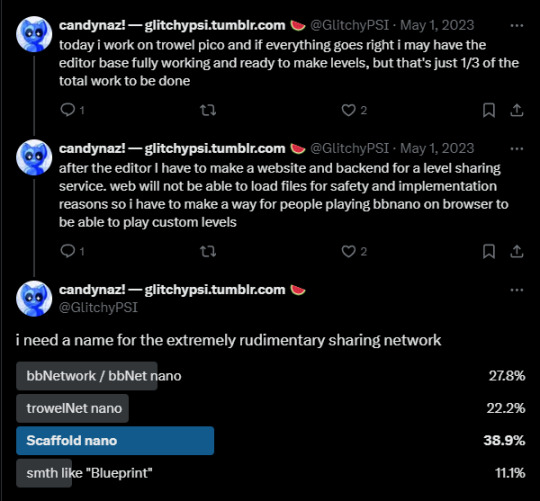
I don't regret it.
Currently, Scaffold's login system is attached to itch.io. In the future, this will use my own account system (called Luna, still in development)
Now then... developing Scaffold's frontend was a challenge in itself, because I'm a masochist. I chose yet another technology to make the frontend in, this time Svelte, Sveltekit as backend saying "okay, no more fear of ServerSideRendering now that I can afford a VPS for this"
but... Svelte has been an absolute joy to work with. Its learning curve even smoother than React's (my first frontend framework, which powers cometSpectrum!), and I got everything rolling very quickly
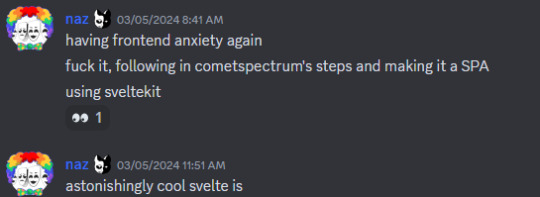
At first, I was going to use my regular website design language, but it's kinda jank, so I said NO and started from scratch with a simpler façade. For the style I wanted to pursue... it was perfect. Some people have complimented the graphic aspect of the site, and I'm happy I could deliver exactly what I wanted. (and yes the icons being in opposite directions compared to bbsprint's UI is entirely on purpose)
BTW, the site is made in such a way that a BB theme could be used as the site's theme and every color will change except for PNG icons, i love it (this functionality is used for people using their OS's Light theme)
This is actually the first made-by-me website project that has "public" facing write actions to a database and stores actual files. It works... very well, and I am very happy about it. It's like a combination of everything I've learnt up to this point, down to API design and interop between programs.
I did say this was the foundation for Scaffold, and I plan for this game to keep Scaffold as its prime way of getting stages, even when getting to storefronts like Steam or GOG. Kind of like an osu! situation.
You're at this part of the message... wanna see how Scaffold's logo used to look like?
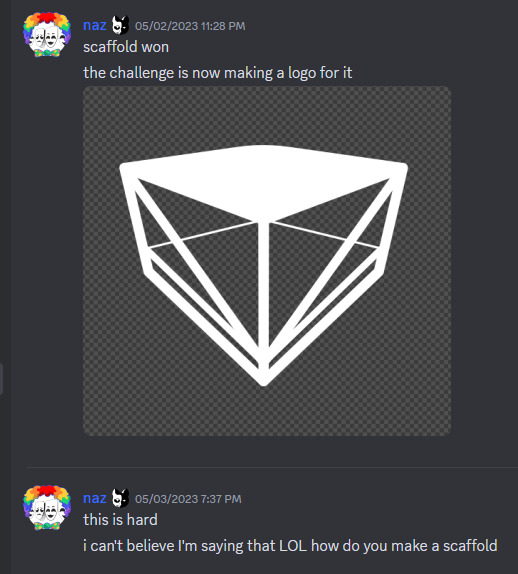
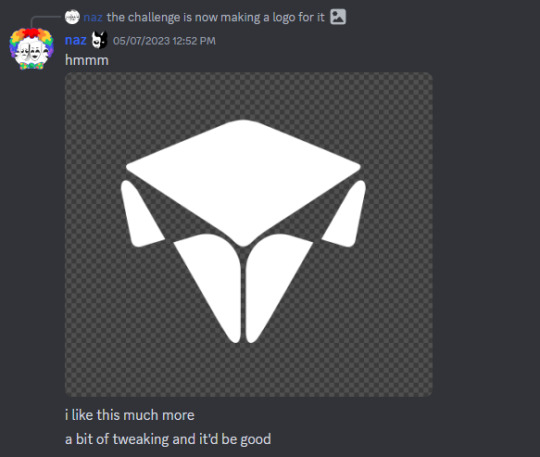
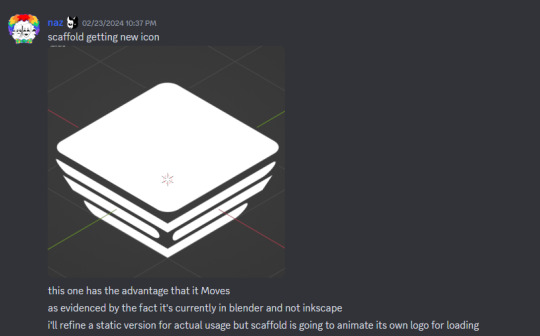
5 notes
·
View notes
Text
reflex.dev
initial thoughts "no state or logic should be on the frontend" is... interesting. the react ecosystem trend feels vvv much like "just dump the entire database into the client and let frontend browser logic do rendering how we want" so it's interesting to see a react derivative that's like well if someone clicks a button we should send it to the server and the server can run the button's onclick and get back to us. bad but interesting
"you shouldn't have to worry about implementation details like what is frontend or backend or what your api calls are". well actually personally i care quite a lot about what the api is.
idk. it's interesting to see people making Intricate Mechanisms in python
fundamentally im not sure why you'd want to use python instead of a .tsx file but hey. ig one advantage is that react doesn't make fetches super easy, iirc you're kinda on your own and have to write a useEffect?
more than anything ig I'm like... why would you want this? why spend time creating this.
the developer docs search is ai enabled which scares me. "why document things if we just throw the codebase in an llm and ask it to lie for us". i guess if devs are using cgpt to help with their projects and you're a new thing, you want to provide an ai helper because cgpt doesn't know about your product and will make shit up entirely
3 notes
·
View notes
Text
Why I Contributed to FujoGuide
If you follow me here or mastodon you may have noticed that I've been reblogging/boosting a lot of posts for something called The Fujoshi Guide to Web Development (@fujowebdev). There's a good chance you followed me or know me from the Dragon Age fandom where I run communities, events, and zines and write fanfic, and you might be wondering why the sudden and drastic departure from my normal content. Why would a writer contribute to something related to webdev? Why have you stopped seeing thirst for Dragon Age characters and started seeing… whatever a FujoGuide is?
The answers to those questions (and more!) are below the cut.
My Coding Journey
I wrote my first lines of code in 1996 (yes, I'm old AF). It was the early days of the internet and tutorials for how to make your own websites were literally everywhere. You couldn't go more than two clicks without finding a how-to written in plain language. But it was painstaking and tedious. CSS didn't exist yet (literally, I started coding about six months before it was released) and even when it appeared it wasn't widely adopted or supported.
It was the "glory days" of Geocities, Myspace themes, Neopets, and Livejournal. If there was a cool site, you could use HTML and/or CSS to customize it. I honed my skills by coding so many tables character profiles for RPs, creating themes, painstakingly laying out user info pages, and building my own site.
Gradually, things changed. Web 2.0 showed up with locked down profiles and feeds you couldn't customize, free website hosts became more difficult to find, and point and click page builders became the way of the web. Shortly after, I took a long break from fandom; frustrated and disappointed with site closures, lost communities, and general fandom wank… it felt like it just wasn't worth it anymore.
I eventually came back, and when I did it meant customizing themes, figuring out how to create tools for my communities, coding tumblr pages (and learning they're not really supported on mobile), and looking at automations for my common tasks. One day, I woke up and thought, "I'm going to make a Discord bot… it can't be that hard."
So, I did it.
An Unexpected Friendship
About a month after I launched my bot to the public, I received a random Discord message from @essential-randomness. A friend had told her about my bot, and she was working on BobaBoard which needed volunteers. I was shocked. First, people were talking about my bot. Second, I wasn't a real coder. I didn't know anything! I just googled a bunch of stuff and got something working. I had no idea what I was doing.
She assured me it was okay. She was willing to teach me what I didn't know - and most of all, that she wanted my help. I took a day or two to think it over, and fatefully filled out the volunteer form. I didn't know if I could be useful or how I could be useful, but I wanted to try.
Programming Is Awful
In the years months that followed, I spent a lot of time in @essential-randomness' DMs complaining about programming… at least once I realized she wouldn't judge me. I was still very much doing things the hard way, taking hours to update a site to add a single link on all the pages. I knew there were easier methods, but I either couldn't find them or once I found them, they were filled with dense jargon which was terrifying.
"An all-in-one zero-javascript frontend architecture framework!" Is that even English? "A headless open-source CMS." Cool. Sounds good. "A full-stack SSG based on Jamstack extending React and integrating Rust-based JS." Those sure are words. With meanings. That someone knows. Not me, though.
I spent so much time looking at what sites claimed was documentation and losing my mind because I had no idea where to even start most of the time. With @essential-randomness' encouragement, I kept at it, experimenting with new things, and jumping in headfirst even when I had no idea what I was doing. And I was so glad. Where I used to struggle keeping one website updated, last year I managed to deploy and update 7 websites. Yeah, you read that right. It was amazing.
The new stuff made it all much, much easier.
An Idea Is Born
Meanwhile, we spent hours discussing why it was difficult to get fandom to try coding. Part of the barrier was the belief you must be some sort of genius or know math or that creative/humanities people can't do it. It is also partially coding communities being unfriendly to newbies and hobbyists; a culture which often thrives on debasing people's choices, deriding them for not understanding, and shouting rtfm (read the fucking manual) and lmgtfy (let me google that for you)- all of which are unhelpful at best and humiliating and abusive at worst. The tech dudebro culture can be unforgiving and mean.
The number of coding-based Discords I've left far outnumbers the ones I've stayed in.
We determined what fandom needed was a place for coders of all skill levels to come together to help and support one another; where they could learn to code and how to join open-source projects they love, and where they could make friends and connections and show off their projects whether they were new or experienced programmers.
And thus… Fandom Coders was born.
What About FujoGuide?
Of course, running a coding group and working on BobaBoard together means we spent a lot of time talking about the state of the web. We both lamented over poor documentation, jargon-rich tutorials, and guides which assume a baseline of knowledge most people don't have. What we needed to do was provide tutorials which start at the beginning… from the ground up (what is a terminal and how do I open it?) without skipping steps. What we needed to do was make those tutorials fun and appealing.
I don't remember exactly the journey it took to get us here if I'm honest. I have no clue who said it first. But I do remember I first started thinking about anthropomorphizing programming languages when we attempted to cast the languages as the Ouran High School boys… and again when I suggested we do a [TOP SECRET IN CASE WE DO IT] group project in Fandom Coders to help people learn about programming.
What I do know is that as last year ended, @essential-randomness became laser-focused on creating our gijinka and moving forward with FujoGuide… and I couldn't say no.
Okay, But… Why Contribute?
To be honest, it's not just that I was around for the birth of the idea. It's ALL of the things in this post - the culmination of three years of frustration trying to figure out what I'm doing with coding, of wading through dense documentation, of wanting to give up before I even start. It's three years of dipping my toes into toxic techbro culture before running away. All added to decades of watching the web become corporate-sanitized, frustratingly difficult to customize, increasingly less fun, and overtly hostile to fans who dare enjoy sexual content.
To sum all of this up, it's the firm belief that we desperately need a resource like this. Something that's for us, by us. Something that builds fans up, instead of tears them down; that empowers them to create for themselves and their communities what no one is creating for them. It is a project I'm deeply passionate about.
And I can't wait until we can bring it to life for you all.
23 notes
·
View notes
Text
Codeblr tag game - realization
@a-fox-studies thank you for tagging me in this!!
At what point in your life did you decide that the world of computers was the one for you?
Heh this is a long one... So read if u want to know some code-es lore :p
But tldr: My dad was a software/computer engineer and his dedication and working spirit is my biggest inspiration, but programming was never a passion of mine - languages were my big thing. This was until I took a programming course and realized that programming is just like learning languages, but with rules that actually apply.
I want to tag: @xiacodes @web-dev-with-bea @compooter-blob @alica-tech @lazar-codes @zoeythebee @cloudycodes @04kid
Programming was always around me when i was younger. My father was a software systems engineer, so when i was a kid i would see him work on matrix looking code, and sometimes he'd even let me press buttons!
But i wasn't really interested in learning anything about computers... I was instead interested in art and especially languages, which was my biggest interest and passion. Then my dad passed away, and following that I'd get more and more interested in programming during my teens, partly to honor him and my family, because on my dad's side almost everyone's a software engineer. I also had an email friend I met on omegle when i was 14-15, and he was 30 something, which... now that i think of it, it was probably pretty a little weird that he wanted to be my friend... but anyways, he was a software engineer and explained what coding/programming was and following that I made my first webpage using only HTML and CSS, in my notepad hahaha!!
But... I didn't do much after that, until I was in my second last year of high school. I signed up to take a programming course for my next and final year. I've always been curious, and wanted all the knowledge I could get, so when a programming course was offered I had to take it! But it was just another small drop in my big lake of interests.
I don't think I realized that computers and programming was what I wanted to do until I visited my family in Mexico 2 years ago, weeks before starting that programming course. For some reason I always saw programming and computers as something out of my reach - i couldn't possibly learn this. However, to prove me wrong, my cousin, who studied software development at the time, showed me his projects, and what he was doing. And, I realized that omg - I could also be doing this? It's within reach!
And then I started learning python in school and I was kind of discouraged, it was so difficult! Most people had previous experience, and seeing what they could already do I felt overwhelmed, thinking I should also be doing that. But I kept coming back to the thought that this is just like learning a language: if I just expose myself to more and more content it will start making sense, and sooner or later I'll be able to form my own sentences and the computer will listen to me.
I've always loved the logic of languages, how the syntax is built, and how verbs are conjugated in accordance to gender, numerus and time in different languages. But... there are always exepctions and irregularities you just have to learn. However, programming is all logic, everything has an explanation, even the seemingly inexplicable concepts. There is always a solution, and my creativity is the limit, and that is what keeps me going.
And then! I was looking at university educations to apply for, when on a whim I found out about my current school, checked what courses they offer and saw something about frontend development. I read the description, and realized that oh my god - this is my type of programming! I get to do design and art AND code? And since studying here, I have realized that, yeah, this is exactly my field, and I love computers and I just want to learn more and more and more, always, and there are so many rabbit holes to fall into within programming.
During my time in school, I would envision myself working with something static in the future; like just going to uni, learning a job, and then doing it. Then, I remember being on studyblr, and seeing the quote "now is the only time in your life when your full time job is to learn" and I took it to heart, and that is what kept me motivated - I thought, what a privilege to just learn for a living. And that is exactly what working with software will be (:
My biggest weakness is finishing writing shit lol, my feedback in on essays was always: ok great, but dont have 3 different points where we think its gonna end but we're met with yet another finishing paragraph. So I'll just end it quickly here, thank you for reading!
#programming#studyinspo#studyblr#studying#tag game#codeblr#coding#programmer#girl coder#python#css#html#long post#code-es#academia#computer science#compsci#computers
19 notes
·
View notes
Text

Tuesday 12th December 2023
End of September: I quit my first proper tech job after 2 years.
End of October: I applied for university on a whim and got a place.
Start of December: Randomly got a new tech job without searching.
God blessing me left, right, and center?! That's just a summary of what's been happening the past few months. I will go into more detail below~!
Here are some tips for talking to people on LinkedIn: post 💕
If you're wondering how I got here in terms of my coding journey: video | post 💕

End of September
I quit my job because it was getting tiring and I couldn't see any chance of me developing there. I will forever be grateful for the opportunity to do my apprenticeship with them and then go on to become their Jr Web Developer - but from there, everything felt static. When the projects being given were getting absolutely boring, I knew then I needed some kind of change. So, I just quit. I said on a Monday I was quitting and that same Friday, I left. Politely and respectfully, of course.

End of October
I was so random how I did this but my Dad suggested for me to apply to university. I told him I didn't even have the right qualifications they wanted. He said "Bet". We looked at the local universities and none mentioned any apprenticeship certifications but mentioned work experience in the field. I applied with that knowledge. Wrote the cringiest personal statement about why the universities should accept me - and it worked. I got into the university of my city which seemed super prestigious to me, 18-year-old me would be screaming that I got a place at the university that I deemed for super smart people.
I made a post about it: link 💕

Start of December
My plan now was to wait until university next September 2024. I planned to relax, level up my current skills by myself or helping via volunteering, and maybe get a few certificates (because I love my name on certificates), and, most importantly: catch up on some anime shows - which I did complete:
Ushio & Tora: 2nd Season
Hunter x Hunter
Vinland Saga
JOJO Part 5 (again)
Jujutsu Kaisen 2nd Season (still watching)
Basically, I was supposed to relax until around February time, then start looking for a new job - tech or non-tech.
!! At this point, I was not looking for a new job !!
Last Tuesday I got a message from a recruiter on LinkedIn saying my profile was cool and would love to help me get an interview for a Frontend Software Engineer position in the city. I had a hunch to tell him I was okay and wasn't looking for a new job right now, but I was getting bored recently and this to me was an exciting new thing to do, so I said yeah why not!
The meeting was on the following Thursday and I met the IT manager. He liked me (same back to him) and wanted me to meet the team next Monday (yesterday). Afterward, I was feeling "Oh wait this is getting serious, I'm only here on a whim, like I'm actually doing good?" so I thought "Okay let's make an effort on the next 'interview'!!".
Monday came and I met the funniest set of people ever in a tech team. Then I thought "Lowkey highkey... would be so cool to work here~!" and the feedback I got was really positive. I got the job. Today I talked to their HR to finalise things.

All of this is thanks to the Almighty God, Lord Jesus, and the Holy Spirit of course~~! 🥰🙏🏾☦️
#codeblr#coding#progblr#programming#studying#studyblr#learn to code#comp sci#tech#programmer#computer science
42 notes
·
View notes